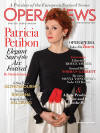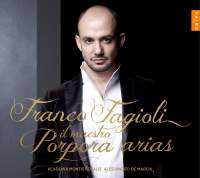Texte paru dans: / Appeared in: |
|
|
Reviewer: Stephen
Francis
Vasta Nicola Porpora (1686–1768) is remembered today as a noted eighteenth-century vocal pedagogue; in his own time, however, he was equally renowned as an opera composer, favoring the florid, expressive Neapolitan style of vocal writing. The present program suggests that Porpora, predictably, knew how to write gratefully and melodically for the voice, though his tunes aren’t so memorable as Handel’s are. The lively, bustling music allows for the expected virtuoso divisions and embellishments, though the composer manages to wring some variety out of the standard tripartite Baroque form. In “Vorrei spiegar l’affanno,” he emulates Handel in “Cara sposa,” contrasting a flowing main theme with an agitated middle section; elsewhere, in “Con alma intrepida” and “Nell’attendere il mio bene,” he reverses the pattern, juxtaposing an energetic A section with an introspective triple-time B. In the setting of text, Porpora can be quite sophisticated, changing the music’s harmonic and emotional colors when the text repeats, most obviously in “Torbido intorno al core.” At other times, however — as with decisions to flip from major into minor (“Il pastor se torna aprile”) or vice versa (“A voi ritorno campagne amene”) between sections — the composer seems at odds with the sense of the text. Argentine countertenor Franco Fagioli is a basically good singer and a poised, sensitive musician. He’s rhythmically alert and phrases with a sure sense of direction, even as he incorporates coloratura embellishments up to soprano C within the line. Yet he can intone the long, spacious line of “Distillatevi o cieli” calmly and evenly. He articulates the text with a lied singer’s sense of timing and mood. And, like some other present-day countertenors, Fagioli isn’t afraid to use the chest register in the low range, not only bringing it into cadences but adeptly ducking into and out of it in mid-phrase. There remain some technical shortcomings of the sort endemic to such head-dominant voices — patches of diffuse tone, covered or unclear vowels and a restricted coloristic range. (Despite the marked change of mood between sections of “Con alma intrepida,” Fagioli can only plow ahead, stuck in a single invariable timbre.) His handling of coloratura, while usually clean, is inconsistent. Some passages are firmly supported; others are aspirated. The melismas of “Nell’attendere il mio bene” devolve into nebulous shakes; the series of trills in the central section of “Distillatevi o cieli” leaves him flustered. The upward repointings of the aria repeats, on the other hand, are particularly brilliant. At the start of the program, the joyful, clangorous introduction to “Se tu la reggi al volo” presages enthusiastic, full-toned orchestral performances from the Academia Montis Regalis. The interlude in “Distillatevi o cieli” has an impressive surge and fullness. Conductor Alessandro De Marchi, however, could have relaxed more in “A voi ritorno campagne amene.” As it is, it flows, but it feels a bit busy. The production is vivid, though I could have done without the thunder and wind-machine effects introducing “Già si desta la tempesta,” the “tempesta” notwithstanding. spacer
|
|
|
|
|
|
|
|
|
Cliquez l'un ou l'autre
bouton pour découvrir bien d'autres critiques de CD |
|




